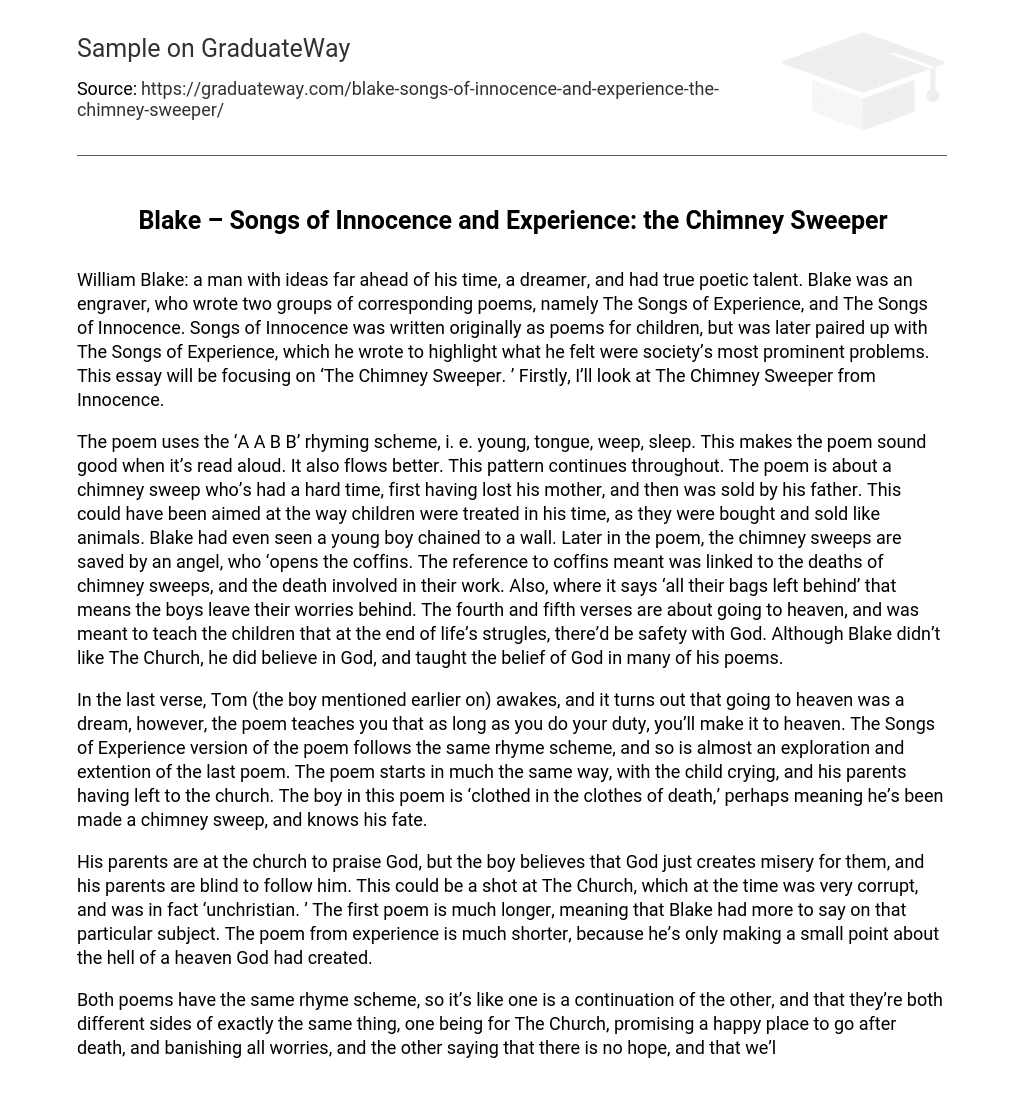William Blake, an innovative and proficient poet and engraver, possessed ideas that were ahead of his era. He authored two poetry collections known as The Songs of Innocence and The Songs of Experience. Despite their initial aim for children, The Songs of Innocence were eventually merged with The Songs of Experience to tackle the urgent matters prevailing in society. This essay will concentrate on ‘The Chimney Sweeper’ from the collection of Innocence.
The poem employs an ‘A A B B’ rhyming scheme, such as young, tongue, weep, sleep, adding to its auditory appeal when recited. This consistent pattern carries on throughout the poem. Its subject matter revolves around a chimney sweep who has faced hardships, first losing his mother and then being sold by his own father. This may reflect the treatment of children during that era when they were treated as commodities, bought and sold like animals. Blake himself witnessed a young boy chained to a wall. Later in the poem, an angel appears and liberates the chimney sweeps by ‘opening the coffins’. The mention of coffins is symbolic of the deaths that chimney sweeps often faced in their line of work. The line ‘all their bags left behind’ suggests that the boys are leaving their worries behind. The fourth and fifth stanzas focus on the concept of ascending to heaven, aiming to teach children that after life’s hardships, they will find sanctuary with God. Despite his aversion to organized religion, Blake did have faith in God and incorporated this belief into many of his poems.
The final verse reveals that Tom, who was previously mentioned, awakens and realizes that his journey to heaven was merely a dream. However, the poem conveys the message that as long as one fulfills their responsibilities, they will ultimately reach heaven. The Song of Experience version of the poem maintains a similar rhyme scheme and serves as an expansion of the preceding poem. It begins in a comparable manner, with the child crying and his parents gone to church. In this rendition, the boy is portrayed wearing death’s attire, potentially suggesting he has become a chimney sweep and is aware of his predetermined fate.
The boy’s parents are at the church to praise God, but he believes that God only brings misery upon them and his parents are ignorant in their faith. This could be a criticism of The Church, which was highly corrupt during that time and no longer aligned with Christian values. Blake expressed more extensive thoughts on this subject in his longer poem. In contrast, the poem from experience is shorter as it focuses on highlighting the harshness of the heaven created by God.
Both poems share a common rhyme scheme, making it appear as if one is a continuation of the other. They represent different perspectives of the same notion: one offers hope and promises a blissful afterlife within The Church, banishing all worries, while the other asserts a lack of hope and suggests that we will be abandoned without a heavenly place. Both poems address a problem that Blake deemed significant. He believed that children were robbed of their childhood by being forced into labor at an early age and dismissed with an attitude of “seen and not heard.”
Blake voices his distress over the mistreatment of children, who were treated as slaves and endured abuse. He firmly believes that children deserve to experience a joyful childhood and finds it troubling that they are deprived of this crucial stage in their lives. The Chimney Sweeper (experience) effectively illustrates this problem by portraying a child weeping in the snow after being abandoned and forced to wear clothing associated with death, potentially symbolizing the grim occupation of being a chimney sweeper. Additionally, Blake condemns the corruption prevalent within The Church through his poetry.
The text illustrates the issues through The Chimney Sweeper (experience) by showcasing how two individuals attending church abandon their child in the harsh icy conditions. This results in the boy losing faith in God and having his perception of heaven shattered. The line ‘Who make up a heaven of our misery’ conveys the boy’s belief that God purposely subjects everyone to a miserable existence, making Him untrustworthy. To summarize, the poems convey the message that the mistreatment of children is wrong, emphasizing the importance of providing proper care as they are still just children. Additionally, the poems incorporate significant Christian themes.





